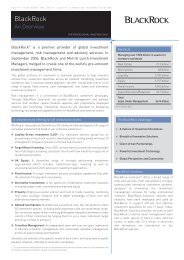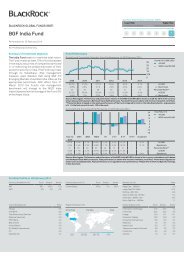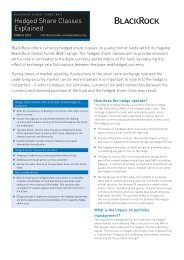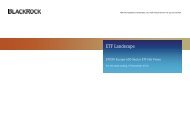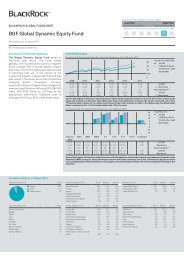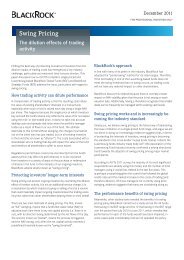Prospectus (4.96 Mb) - BlackRock International
Prospectus (4.96 Mb) - BlackRock International
Prospectus (4.96 Mb) - BlackRock International
You also want an ePaper? Increase the reach of your titles
YUMPU automatically turns print PDFs into web optimized ePapers that Google loves.
In addition, as a result of currency exchange rate exposure and the profits, losses and expenses of hedging transactions<br />
borne by non-US Dollar denominated Shares, the performance of such Shares will differ from that of Shares that are<br />
denominated in US Dollars. Furthermore, while the profits, losses and expenses relating to currency hedging<br />
transactions, if any, will be specifically allocated to and paid by the class of Shares to which such transactions are related,<br />
under the laws of Jersey, were the assets of the Company attributable to such class of Shares insufficient to pay any of its<br />
specific liabilities, including without limitation, their specific hedging expenses, such liabilities would be borne by the<br />
Company as a whole. Further, the use of derivatives and other instruments to reduce risk involves costs. Consequently,<br />
the use of hedging transactions might result in lower performance for the hedged Shares than if the Company had not<br />
hedged such Shares’ exposure against foreign currency exchange risks.<br />
There can be no assurance that appropriate hedging transactions will be available to the Company or that any such<br />
hedging transactions will be successful in protecting against currency fluctuations or that the performance of the Shares<br />
will not be adversely affected by the currency exchange rate exposure. In addition, the Company may concentrate its<br />
hedging activities with one or a few counterparty(ies) and the Company is subject to the risk that a counterparty may fail to<br />
fulfil its obligations under a hedging contract. To the extent that a counterparty fails to fulfil its obligations, the relevant<br />
Share class, and potentially the Company as a whole, could suffer loss.<br />
Fluctuations in currency exchange rates will similarly affect the US Dollar equivalent of any interest, dividends or other<br />
payments made to the Company or Fund Investments denominated in a currency other than US Dollars. Among the<br />
factors that may affect currency values are trade balances, the level of short-term interest rates, differences in relative<br />
values of similar assets in different currencies, long-term opportunities for investment and capital appreciation and<br />
political developments.<br />
TRANSFER RESTRICTIONS<br />
The Shares are subject to restrictions on transfers to any person located in the United States or who is a US person, which<br />
may impact the price and liquidity of the Shares. The Shares have not been registered in the United States under the US<br />
Securities Act or under any other applicable securities law and are subject to restrictions on transfer contained in such<br />
laws and under ERISA regulations.<br />
The Company intends to restrict the ownership and holding of its Shares so that none of its assets will constitute “plan<br />
assets” of any Plan. The Company intends to impose such restrictions based on deemed representations in the case of its<br />
Shares. If the Company’s assets were deemed to be “plan assets” of any Plan subject to Title I of ERISA or Section 4975 of<br />
the US Internal Revenue Code, pursuant to Section 3(42) of ERISA and US Department of Labour regulations promulgated<br />
under ERISA by the US Department of Labour and codified at 29 C.F.R. Section 2510.3-101 as they may be amended or<br />
modified from time to time (collectively, the “Plan Asset Regulations”), (i) the prudence and other fiduciary responsibility<br />
standards of ERISA would apply to investments made by the Company and (ii) certain transactions that the Company or a<br />
subsidiary of the Company may enter into, or may have entered into, in the ordinary course of business might constitute or<br />
result in non-exempt prohibited transactions under Section 406 of ERISA or Section 4975 of the US Internal Revenue Code<br />
and might have to be rescinded. Governmental plans and certain church plans, while not subject to Title I of ERISA or<br />
Section 4975 of the US Internal Revenue Code, may nevertheless be subject to other state, local or other laws or<br />
regulations that would have the same effect as the Plan Asset Regulations so as to cause the underlying assets of the<br />
Company to be treated as assets of an investing entity by virtue of its investment (or any beneficial interest) in the<br />
Company and thereby subject the Company or the Investment Manager (or other persons responsible for the investment<br />
and operation of the Company assets) to laws or regulations that are similar to the fiduciary responsibility or prohibited<br />
transaction provisions contained in Title I of ERISA or Section 4975 of the US Internal Revenue Code.<br />
Each purchaser and subsequent transferee of the Shares will be deemed to represent and warrant that no portion of the<br />
assets used to acquire or hold its interest in the Shares constitutes or will constitute the assets of any Plan. The Articles<br />
of Association of the Company provide that the Board of Directors may refuse to register a transfer of Shares to any<br />
person they believe to be a Prohibited US Person or a Plan investor. If any Shares are owned directly or beneficially by a<br />
person believed by the Board of Directors to be a Prohibited US Person or a Plan investor, the Board of Directors may give<br />
notice to such person requiring him either (i) to provide the Board of Directors within 30 days of receipt of such notice with<br />
sufficient satisfactory documentary evidence to satisfy the Board of Directors that such person is not a Prohibited US<br />
Person or a Plan investor or (ii) to sell or transfer their Shares to a person qualified to own the same within 30 days and<br />
within such 30 days to provide the Board of Directors with satisfactory evidence of such sale or transfer. Where condition<br />
(i) or (ii) is not satisfied within 30 days after the serving of the notice, the person will be deemed, upon the expiration of<br />
such 30 days, to have forfeited their Shares.<br />
CHANGES IN LOCAL LAWS OR REGULATIONS<br />
For regulatory, tax and other purposes, the Company and the Shares may be treated differently in different jurisdictions.<br />
For instance, in certain jurisdictions and for certain purposes, the Shares may be treated as units in a collective<br />
investment scheme. Furthermore, in certain jurisdictions, the status of the Company and/or the Shares may be uncertain<br />
or subject to change, or it may differ depending on the availability of certain information or disclosures by the Company.<br />
The Company may be constrained from or may find it unduly onerous to disclose any or all of such information or to<br />
prepare or disclose such information in a form or manner which satisfies the regulatory, tax or other authorities in certain<br />
jurisdictions. Failure to disclose or make available information in the prescribed manner or format, or at all, may<br />
8



